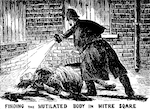|
"Society has come to expect the wizardry of forensic science to solve all crimes, but without the human element of deductive skills, teamwork, very hard investigation, and smart prosecution, evidence means nothing." – Patricia Cornwell

How do we know this to be true?
I write about evidence a lot because it peppers most of my conversations. Whether we're taking about a new market, a new product, a sales cycle, or career advice I'm asking about evidence. How do we know? Are we sure?
The truth is out there, as Agent Mulder might say. Go get it.
I lead a group of high school students through a course on entrepreneurship. We say, you have a new idea, congratulations. Now what? Through a series of exercises and exhortations we encourage them to come to the conclusion that the answers are out there, and the best answers come from future customers.
Business leaders already know this. Yet we still sit in coffee shops, come up with ideas, and get to work. What keeps us from getting evidence at the start?
There's not just one reason, but this is a prevalent one.
I don't want to blow my chance with a prospect.
It feels like if we can't explain the solution clearly, or don't have a working example, or are missing something, we can't go back. Each prospective customer is to be treated gently until the time is right. Like Eminem says, you only get one shot.
Re-applying our lead question, how do we know this to be true? Are we sure we only get one shot?
An example
A client approached an influential industry group 6 months before working with me. The feedback from the group was negative and sharp and the owner moved on. As we are reviewing the feedback I note it is hard to read, almost mean, but it's primarily focused on his presentation. "We should call on them again," I suggest. "The product had little pushback, you've improved it, and we can fix the presentation." He disagrees but finds it hard to fight my what have we got to lose argument.
We send the note. We get his new, better presentation scheduled. There is a lot of interaction with participants. At the end, the moderator thanks everyone for their time and says, "Thank you for reaching back out to us. We have a lot of presentations but no one takes our feedback and returns to demonstrate their progress. This was great."
So there you have it. Anecdotal evidence you won't blow your chance of returning to a prospect, or group of prospects.
Get out there.
|